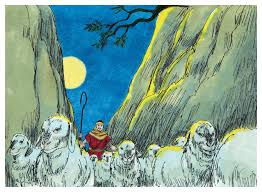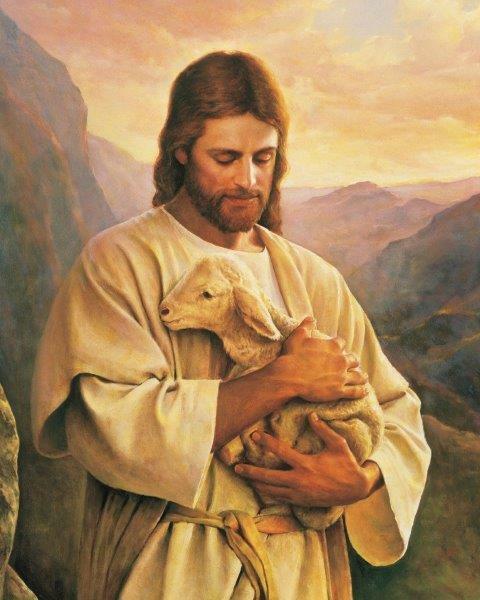“Your rod and Your staff, they comfort me.” Psalm 23:4b
About six hundred times, the Scriptures refer to sheep, lambs, ewes, sheepfolds, and shepherds. God seems to be saying to us, “If you want to learn something about the Christian life, watch the sheep. And if you want to know something about Me, watch a faithful shepherd.”
In the first half of verse 4, we saw that one of the paths our Good Shepherd leads us down goes through “the valley of the shadow of death.” David writes that he was comforted by his Shepherd as he led him through this dark time in his life. He says, “Your rod and Your staff, they comfort me.”
The “rod” refers to a great oak club about two feet long with a round head in which the shepherd pounded sharp bits of metal. He used the rod to defend his flock against wild beasts. A skillful shepherd not only swung the club to smash the head of a predator, but he would also throw the club like a missile over the heads of his sheep to strike a wolf or mountain lion lurking in the distance.
The “staff” was a long walking stick that was bent or hooked at one end. The shepherd used his staff to restrain sheep from wandering or hooked their legs to pull them out of holes into which they had fallen. He also used it to pull branches aside when a sheep got tangled in a thicket or to beat back the high grass to drive out snakes coiled on the path.
The sheep take comfort from the shepherd’s power.The word “comfort” means to give strength. To comfort is to give strength by supplying power. God offers us more than a handkerchief to dry our tears – He offers us His power and His might. But if we are honest with ourselves, we may be somewhat afraid of God’s power perhaps because we think He is like us – unpredictable. One day we are up and another day we are down. One day we are all smiles and another day we are all frowns. We suspect God is that way. One day He uses His power on our behalf and another day He wants to flex His muscles some and hurl a thunderbolt into our lives.
We need to remember that our Good Shepherd is as gracious as He is powerful. God cannot use His power outside of His love. His grace limits His power just as His holiness limits His love. God will not move in might except to carry out the desires of His heart.
For example, let’s say you have a daughter who becomes very ill with the coronavirus. When the doctor examines her, he then rushes her to the hospital. He tells you that he is not sure she will live through the night. You are standing there, watching helplessly as your little girl struggles for her life. In those moments, some great truths in Scripture come to your mind. First of all, you know that God loves you and He loves your little girl (John 3:16). After all, He loved you enough to die for you both (Romans 5:8). You know that nothing and no one can separate you both from His love (Romans 8:35-39).
Yet you loved your little girl, too, and you are helpless to do what your love desires. Then you realize that the God who loves you both is also the God of power (cf. Jeremiah 32:17). And you know that He has the strength to do what His love desires. If God chose that your daughter stay with you, He had the power to keep her alive. And if God chose to take your daughter home, this, too, would be His loving choice. He has the power to do anything that His heart knows best.
The comfort of God can calm our fears because we can rest our lives in His strength. Would it really comfort us if all our “whys” were answered? Why the child had to meet that deadly virus? Why all of this social distancing? Why did the train have to be there the moment those teenagers crossed the railroad tracks? Why all the flooding and property damage from the typhoon?
If God simply gave scientific or philosophical explanations to our bruising questions, could they really comfort us? A child is not comforted by being told why she has contracted the coronavirus. Nor is a child comforted by being told why her finger hurts when it is bruised in a car door, or why her tummy aches. She is comforted by knowing that her mother loves her, and that she can do something about her hurt.
We can obtain much comfort from the defending rod and staff of our Good Shepherd, not only for ourselves but for others. We may not be able to visit people face to face right now, but we can pray to the One who can be there with them to comfort them with His powerful love and presence.
Prayer: Good Shepherd, there is so much in life that I do not understand. Many people are going through dark times right now. There is much chaos and confusion in our world today. But this chaos and confusion begin to fade away when I turn the eyes of my heart towards You. I really do not need answers to my questions right now. I need You O Lord. Knowing that You love me without condition and that You have the power to take care of me always, is the greatest source of comfort and security for me at this moment. Thank You so much for Your rod which You hurl at the enemy when he whispers lies that provoke fear in my heart. Thank You for Your staff which You use to guide me or rescue me when I get into trouble. I need You Jesus. Nothing more and nothing less. Thank You for being a faithful, loving, and all powerful Shepherd. My trust is in You. In Your name. Amen.




